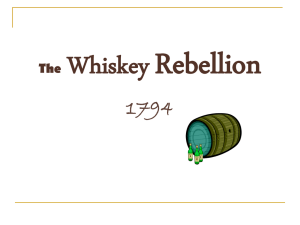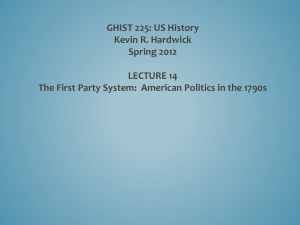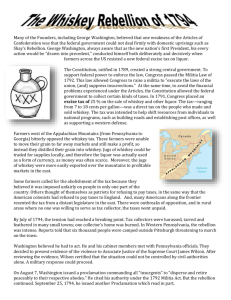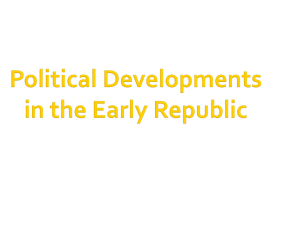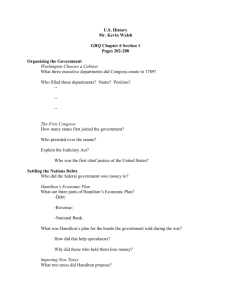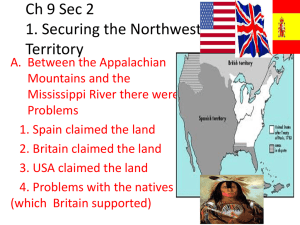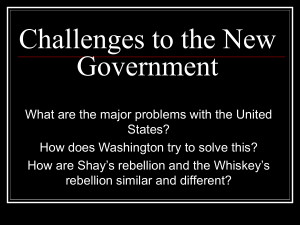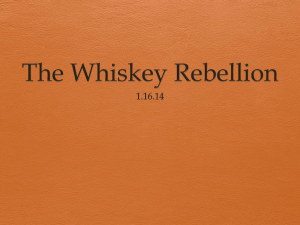Chapter 5 The Whiskey Rebellion
advertisement
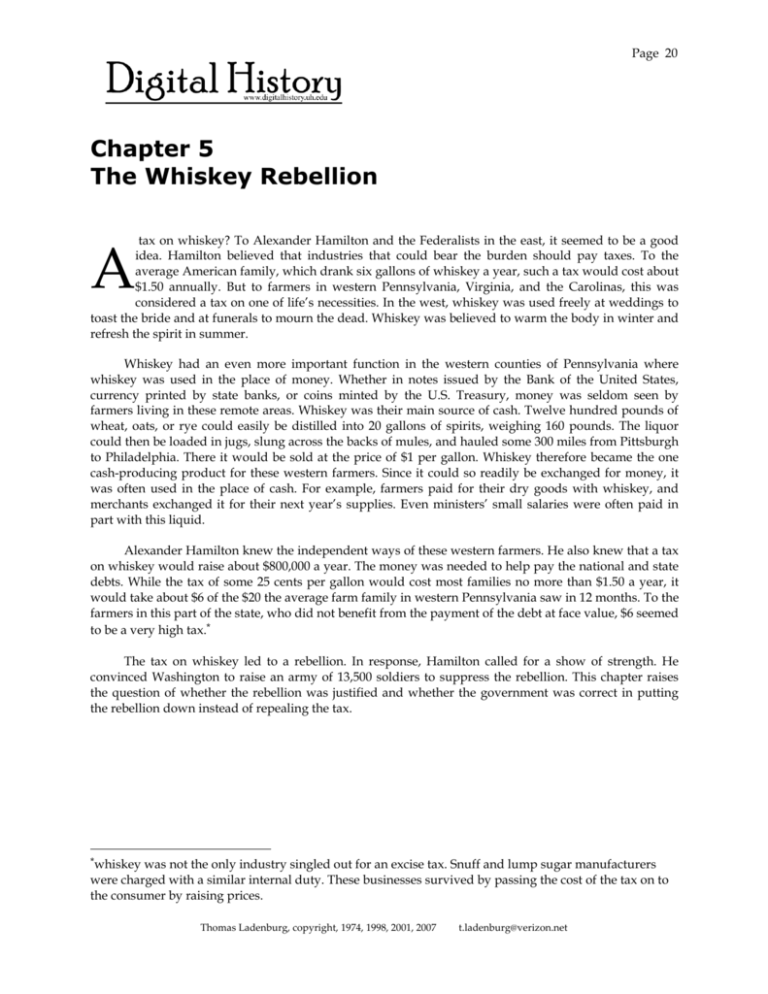
Page 20 Chapter 5 The Whiskey Rebellion tax on whiskey? To Alexander Hamilton and the Federalists in the east, it seemed to be a good idea. Hamilton believed that industries that could bear the burden should pay taxes. To the average American family, which drank six gallons of whiskey a year, such a tax would cost about $1.50 annually. But to farmers in western Pennsylvania, Virginia, and the Carolinas, this was considered a tax on one of life’s necessities. In the west, whiskey was used freely at weddings to toast the bride and at funerals to mourn the dead. Whiskey was believed to warm the body in winter and refresh the spirit in summer. A Whiskey had an even more important function in the western counties of Pennsylvania where whiskey was used in the place of money. Whether in notes issued by the Bank of the United States, currency printed by state banks, or coins minted by the U.S. Treasury, money was seldom seen by farmers living in these remote areas. Whiskey was their main source of cash. Twelve hundred pounds of wheat, oats, or rye could easily be distilled into 20 gallons of spirits, weighing 160 pounds. The liquor could then be loaded in jugs, slung across the backs of mules, and hauled some 300 miles from Pittsburgh to Philadelphia. There it would be sold at the price of $1 per gallon. Whiskey therefore became the one cash-producing product for these western farmers. Since it could so readily be exchanged for money, it was often used in the place of cash. For example, farmers paid for their dry goods with whiskey, and merchants exchanged it for their next year’s supplies. Even ministers’ small salaries were often paid in part with this liquid. Alexander Hamilton knew the independent ways of these western farmers. He also knew that a tax on whiskey would raise about $800,000 a year. The money was needed to help pay the national and state debts. While the tax of some 25 cents per gallon would cost most families no more than $1.50 a year, it would take about $6 of the $20 the average farm family in western Pennsylvania saw in 12 months. To the farmers in this part of the state, who did not benefit from the payment of the debt at face value, $6 seemed to be a very high tax.* The tax on whiskey led to a rebellion. In response, Hamilton called for a show of strength. He convinced Washington to raise an army of 13,500 soldiers to suppress the rebellion. This chapter raises the question of whether the rebellion was justified and whether the government was correct in putting the rebellion down instead of repealing the tax. *whiskey was not the only industry singled out for an excise tax. Snuff and lump sugar manufacturers were charged with a similar internal duty. These businesses survived by passing the cost of the tax on to the consumer by raising prices. Thomas Ladenburg, copyright, 1974, 1998, 2001, 2007 t.ladenburg@verizon.net Page 21 The Debate Over the Whiskey Tax Alexander Hamilton’s suggestion for a tax on whiskey in 1791 caused a heated debate in Congress. James Jackson of Georgia thought the whiskey tax unfair and proposed as an alternative a tax on "salaries, pensions, and lawyers.” When told that the people should drink less whiskey, Jackson defended their right to get drunk. Hugh Williamson of North Carolina proposed that a tax be laid on beer and cider consumed in New England. He complained of the injustice of taxing people who opposed Hamilton’s policy of paying face value for bonds and gained least from it. A common complaint among farmers was that raising money would benefit the wealthy speculator who “had bought the bonds for a song and then corruptly influenced the government to pay them at face value.”18 Those who supported the tax pointed out that alcohol was a luxury (and a sinful one at that) and not a necessity. Others suggested the farmers raise the price of their whiskey and pass the tax on to the consumer. Many pointed out that the rich were already paying a tariff of eight percent on imports, costing them far more than $6 in taxes each year. James Madison and Thomas Jefferson remained silent on the issue of the whiskey tax in part because they had made a deal with Alexander Hamilton. The deal involved moving the nation’s capital from Philadelphia to Washington D.C., in exchange for the federal government’s assuming the states’ unpaid revolutionary war debts. The whiskey tax was Hamilton’s chosen method of paying for part of this obligation, and the two leaders did not suggest an alternative. The Whiskey Rebellion After the tax was passed, many of the farmers in the west remembered how the colonists had protested against England’s policies. Tax collectors were tarred and feathered by angry mobs. Liberty poles with slogans against unjust taxation were planted in the ground. Committees of corres-pondence were formed, and several towns and counties passed resolutions stating why they opposed the whiskey tax. Alexander Hamilton was quick to warn President Washington about the dangers of revolution. He advised the president to raise an army in order to stop the Whiskey Rebellion. Washington preferred to get Artist’s depiction of whiskey rebels tarring voluntary obedience. He issued a proclamation and feathering a tax collector. calling for people to pay the tax and obey the law. He asked Congress to pass a law that would bring people accused of interfering with tax collection or law enforcement to trial in Philadelphia, some 300 miles from Pittsburgh—the scene of the disturbances. Opponents were quick to point out that their government was acting like George Ill, who wanted to bring colonists 3,000 miles to stand trial in England. For some two years, the hated tax was collected without much open opposition. In 1794, however, violence broke out once more. Tax collectors were attacked, and U.S. soldiers coming to their aid were surrounded. A federal officer was killed and an army of some 5,000 rebels prepared to march on 18 Leland D. Baldwin, Whiskey Rebellion: The Story of a Frontier Uprising, (University of Pittsburgh Press: Pittsburgh, 1939), p. 62. Thomas Ladenburg, copyright, 1974, 1998, 2001, 2007 t.ladenburg@verizon.net Page 22 Pittsburgh. On August 4, 1794, Supreme Court Justice and Founding Father James Wilson declared the western counties of Pennsylvania to be in open rebellion against the U.S. government. The Rebellion Is Suppressed Following Justice Wilson’s announcement, President Washington made hasty preparations to suppress the Whiskey Rebellion. He raised an army of 13,500 men that marched from Philadelphia with the president in command. After five days Washington turned back and left Treasury Secretary Alexander Hamilton in charge of the army, which was almost as large as any commanded by Americans during the Revolution. The advance of this huge force and a terrible rainstorm brought a quick end to the rebellion. Nevertheless, Hamilton insisted on keeping the army in the western counties through October and November. Hundreds of suspects were rounded up, and many were kept in corrals. There was only enough evidence to put 20 men on trial for conspiracy to commit rebellion. These men were brought 300 miles to Philadelphia, arriving on Christmas Day, 1794. They were jeered and taunted by townsfolk as they were herded through the streets. Their trials President Washington reviews the troops as they prepare to march against the whiskey rebels lasted till the following summer. Hamilton and Jefferson on the Whiskey Rebellion “Beware my dear sir,” Hamilton had once written, “of employing an inadequate force to put down a riot.” Only the fear of punishment, the Secretary of the Treasury thought, would hold a nation together: “The government ought to inspire respect with a display of strength.” At another time he had written that communities divided themselves into the few (the rich and well-born) and the many (the masses of people). The rich and well-born, Hamilton believed, ought to rule. They would check the unsteadiness of the people and maintain good government. Thomas Jefferson believed that the purpose of government is to protect the unalienable rights of its citizens, and that these rights include life, liberty, and the pursuit of happiness. The people have the right to rebel, Jefferson had written in the Declaration of Independence, when the government deprives them of their rights. He had also once written that a little rebellion now and then was a good thing—a medicine necessary for “the sound health of government.” Although Jefferson had resigned from the cabinet by the time of the Whiskey Rebellion, he commented, “the first error was to pass it (the whiskey tax); the second was to enforce it; and the third, to make it the means of splitting this Union.” In Philadelphia, the federal court found only two of the 20 rebels guilty of conspiracy against the government of the United States. Using the power of his office, President Washington pardoned them both. For the next six years, the whiskey tax was collected, but it is doubtful that the revenue from the tax Thomas Ladenburg, copyright, 1974, 1998, 2001, 2007 t.ladenburg@verizon.net Page 23 actually exceeded the cost of suppressing the rebellion. After he became president in 1801, Thomas Jefferson had the tax repealed. Student Exercises: 1. Considering the alternatives, was the Whiskey tax fair? Was it necessary? 2. Describe the Whiskey Rebellion and the events leading to it. 3. Prepare an argument in favor of repealing the tax or suppressing the rebellion. Consider whether the tax was fair, and whether the government should appear reasonable and just or strong and unyielding. Thomas Ladenburg, copyright, 1974, 1998, 2001, 2007 t.ladenburg@verizon.net
